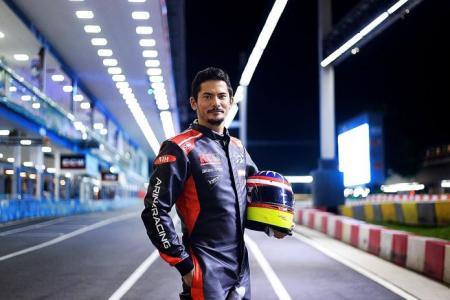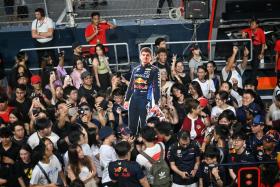Confessions of a race car driver: Expectations too unrealistic
Former Minardi driver Alex Yoong says it's more hard work than glamour, especially if your team is broke
Former Formula One driver Alex Yoong says: "The world probably isn't very kind to those at the back."
With a string of disqualifications and race retirements to his name, Yoong is not likely to be remembered as a racing legend.
But the Malaysian driver carried the racing hopes of the region in 2001 and 2002, as the first non-Japanese Asian driver in F1 in half a century, since Thailand's Prince Bira in the 1950s.
Yoong raced in the Minardi F1 team, which was beset with financial difficulties and was not competitive on the track.
He struggled to make an impact at the tail end of the grid, finishing 20th in 2002 before losing his place.
He sits down with The New Paper on Sunday for a candid chat on his career, confessing that he "didn't do well enough" in his F1 heyday.
Yoong, 40, says: "At the time, my expectations were too unrealistic and I thought that, maybe, I could do well and deserve to be here (in F1).
"I compared myself to people in my age group, but I never realised that these guys have been karting since they were eight and that I just hadn't done enough racing. I started racing only at 16, I never raced karts. I started racing in Proton Sagas for two years."
He would be severe with himself over every failure, but never because of the "weight" of the public pressure on him.
Recalling his best result in the 2002 Australian GP, he says: "I finished seventh and the Prime Minister of Malaysia congratulated me by text message. It meant nothing to me, because I actually drove a really bad race and I got the position because so many other cars crashed out.
"The pressure a country can put on someone's shoulders is nowhere near the pressure I put on myself."
He was particularly upset after a disqualification in the 2002 San Marino GP, but he remembers that as the night his son was conceived.
Yoong says: "That was a huge moment of vulnerability for me, so it just happened."
Life as an F1 driver then was also not as glamorous as one might think.
During the season, he relied on public transport to get around because, in his words, the team was "broke".
"Any money we could find, it went straight back to pay our debtors. So... I couldn't even rent a car," he says.
The team could ill afford to pay for regular practice sessions in an F1 car, but he still had to work very hard.
"There is just not enough time. You're in the gym all the time and the competition is too tough. As soon as you start slacking a bit, it starts showing up in the results," he adds.
That, says Yoong, is what makes motor sports so interesting.
He explains: "It is not like a company where you have to wait for each quarter or each year to see how the company is doing. We see the results straightaway. The pressure to perform and for you to work hard is always there."
These days, Yoong is recognised for his work as the resident F1 pundit on Fox Sports.
He is covering the Singapore Grand Prix for the network this weekend.
Yoong, who began commentating a decade ago, jokes that life after F1 is more enjoyable.
He says: "In F1, you get invited to all the nice parties, but you can't enjoy the parties. You're always thinking about training the next day, you can't afford to have a wild night.
"Punditry is the opposite. We don't get invited to all the nice parties anymore but when we do get invited, we go off the handle and have a great time."
He has learnt to take things in his stride and now looks back at his career with pride.
He also races in the Audi R8 LMS Cup series, in which he is the reigning champion.
Yoong says: "(In F1,) you never enjoy your successes and your failures haunt you. But it is later on in life, after seeing what I went through in perspective, that I am able to appreciate the job that I did.
"Which means when I do screw up occasionally, I'll bounce back from it stronger. And if I do have success, I'll enjoy it more."
SECRETS OF THE TRADE
- Being an F1 driver means constant training and work. Slack off for a bit and you will need a lot of energy to regain that momentum and rhythm needed on race day.
- You are not going to beat your teammate by worrying about him. Focus on your own performance and beating yourself first.
- Safety is important, but do not let it be an obstacle. The moment when thoughts about death or injury start to impede you is the time to stop racing
Get The New Paper on your phone with the free TNP app. Download from the Apple App Store or Google Play Store now


